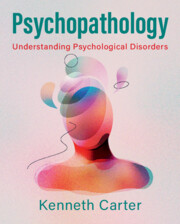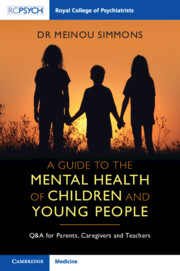Refine search
Actions for selected content:
16 results
Association of adult caregiver depression with developmental disorder likelihood in Ugandan children perinatally exposed and unexposed to HIV
-
- Journal:
- Cambridge Prisms: Global Mental Health / Volume 12 / 2025
- Published online by Cambridge University Press:
- 24 October 2025, e120
-
- Article
-
- You have access
- Open access
- HTML
- Export citation
Chapter 10 - Anxiety Disorders
- from Part III - Application and Adaptations for Mental Health Presentations
-
- Book:
- Cambridge Guide to Cognitive Behavioural Therapy (CBT)
- Published online:
- 18 November 2025
- Print publication:
- 18 September 2025, pp 93-97
-
- Chapter
- Export citation
Chapter 10 - LGBTQIA+ Care
-
-
- Book:
- Urban Emergency Medicine
- Published online:
- 20 July 2023
- Print publication:
- 03 August 2023, pp 123-132
-
- Chapter
- Export citation

Psychopathology
- Understanding Psychological Disorders
-
- Published online:
- 22 December 2022
- Print publication:
- 22 December 2022
-
- Textbook
- Export citation
Phenomenology, quality of life, and predictors of reversibility in patients with drug-induced movement disorders: a prospective study
-
- Journal:
- CNS Spectrums / Volume 28 / Issue 5 / October 2023
- Published online by Cambridge University Press:
- 19 December 2022, pp. 534-536
-
- Article
-
- You have access
- HTML
- Export citation

A Guide to the Mental Health of Children and Young People
- Q&A for Parents, Caregivers and Teachers
-
- Published online:
- 27 October 2022
- Print publication:
- 03 November 2022
Shame and psychopathology. Its role in the genesis and perpetuation of different disorders
-
- Journal:
- European Psychiatry / Volume 65 / Issue S1 / June 2022
- Published online by Cambridge University Press:
- 01 September 2022, p. S703
-
- Article
-
- You have access
- Open access
- Export citation
COVID-19 related sleep disorders and the mental health
-
- Journal:
- European Psychiatry / Volume 65 / Issue S1 / June 2022
- Published online by Cambridge University Press:
- 01 September 2022, pp. S484-S485
-
- Article
-
- You have access
- Open access
- Export citation
Chapter 6 - Emotional Injury: Causes and Consequences
-
- Book:
- Dear John
- Published online:
- 04 January 2022
- Print publication:
- 06 January 2022, pp 179-210
-
- Chapter
- Export citation
Modern system approach to the diagnosis, therapy and rehabilitation of mental disorders
-
- Journal:
- European Psychiatry / Volume 64 / Issue S1 / April 2021
- Published online by Cambridge University Press:
- 13 August 2021, p. S508
-
- Article
-
- You have access
- Open access
- Export citation
P0335 - Posttraumatic stress disorder and telepsychiatry
-
- Journal:
- European Psychiatry / Volume 23 / Issue S2 / April 2008
- Published online by Cambridge University Press:
- 16 April 2020, p. S398
-
- Article
-
- You have access
- Export citation
7 - Clinical Illustrations of Voice Quality
-
- Book:
- Voice Quality
- Published online:
- 21 June 2019
- Print publication:
- 20 June 2019, pp 205-238
-
- Chapter
- Export citation
Review: psychiatric and medical consequences of disordered sleep – Corrigendum
-
- Journal:
- Irish Journal of Psychological Medicine / Volume 32 / Issue 3 / September 2015
- Published online by Cambridge University Press:
- 30 October 2014, p. 297
- Print publication:
- September 2015
-
- Article
-
- You have access
- HTML
- Export citation
Review: psychiatric and medical consequences of disordered sleep
-
- Journal:
- Irish Journal of Psychological Medicine / Volume 32 / Issue 2 / June 2015
- Published online by Cambridge University Press:
- 14 October 2014, pp. 209-217
- Print publication:
- June 2015
-
- Article
- Export citation
Conception of Integrative Medicine
-
- Journal:
- Prehospital and Disaster Medicine / Volume 20 / Issue S1 / April 2005
- Published online by Cambridge University Press:
- 28 June 2012, p. 35
-
- Article
-
- You have access
- Export citation
Previously undiagnosed congenital vascular ring presenting as dysphagia in a six-week post-partum female
-
- Journal:
- The Journal of Laryngology & Otology / Volume 114 / Issue 11 / November 2000
- Published online by Cambridge University Press:
- 08 March 2006, pp. 881-882
- Print publication:
- November 2000
-
- Article
- Export citation
